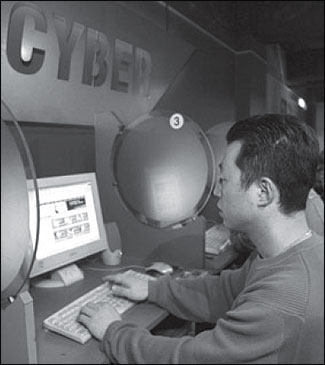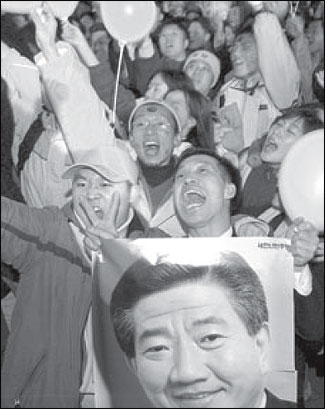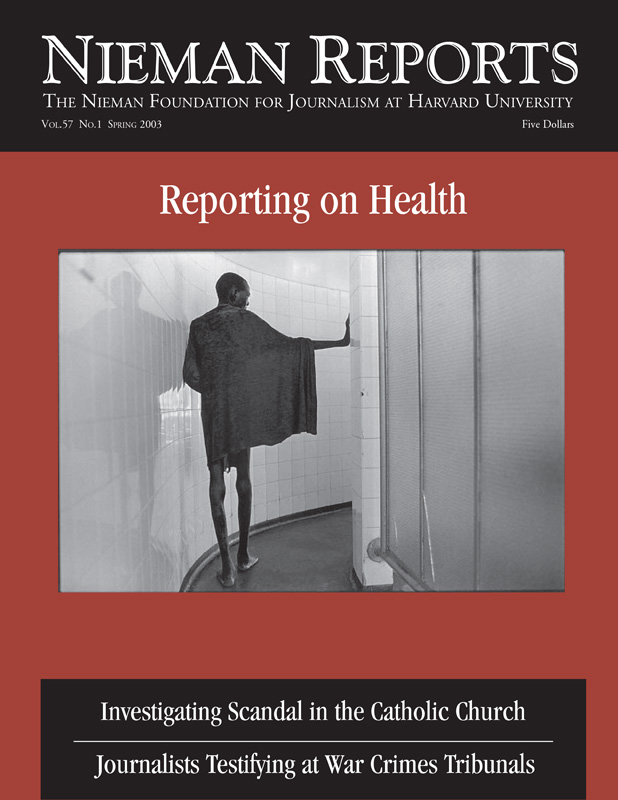
A South Korean man surfs the Web at an Internet cafe in Seoul. Photo by Rhee Dong-Min/Reuters.
December’s presidential election in Korea resulted in a victory for Roh Moo-hyun, who was the candidate for the Millennium Democratic Party (MDP). As the first post-war generation politician to head the nation, his emergence as the country’s new president can be interpreted as a victory of reform, post-coldwar sentiment, and antiregionalism. But it was also a victory of the Internet, where the driving force of the young generation is bringing a shift in media power, creating what can be described as a “cyber Acropolis.”
Riding on the crest of “netizens’” support, the high-school graduate turned lawyer beat the odds to become president. Roh is unique in his political roots in Korean politics, in which deep-rooted regionalism traditionally pits the southeastern Gyeongsang Province against the southwestern Cholla Province. The Gyeongsang Province (from which Roh is a native) has been the stronghold of Korean politics for the past 40 years and became the base of the opposition Grand National Party (GNP) during the recent Kim Dae-Jung administration, when the Cholla Province served for the first time as the ruling party’s political turf. Regionalism in Korea has been manifested by voters’ strong preference for a presidential or parliamentary candidate representing a political party based in that region. Roh, who vowed to abolish regionalism, represents a party that is based in the Cholla Province, so it was not surprising that he failed in mayoral and parliamentary elections four times in his hometown in Gyeongsang Province, because the party he belonged to was not based there.
Roh was often dubbed as an “unrealistic, foolhardy” politician, but he held firm during the rough times he faced in politics. His repeated failure to win political office, in the end, strengthened him as a presidential candidate, in part because of the reaction and work of his young supporters. Immediately after Roh’s loss in the parliamentary election in 2000, his supporters, mostly people in their 20’s and 30’s, voluntarily gathered to form an online support group by the name of “Nosamo,” which is the Korean acronym for “people who love Roh Moohyun.” This action marked the beginning of what became one of Roh’s strongest political assets.

Members of president-elect Roh Moo-hyun’s Internetbased support group, “Nosamo,” celebrate his victory. Photo by Jin Seong-cheol/Yonhap News Agency.
The Internet Replaces Newspapers
No one will dispute that Roh owes his victory to the Internet, which provided a reliable source of news and an outlet for people to voice their opinions. As his election polls showed, his support mostly came from reform-minded young voters. Sixty percent of voters in their 20’s and 30’s cast ballots for Roh. In a highly technological country, where its people spend more time surfing online than any other place in the world, the Internet served as a window through which the younger generation could see the world and create a forum for their political debates.
What also happened is that online news services began to emerge as an important source of news for this online generation who are more distrustful about the news they read in the newspapers. The outcome of the Korean presidential election clearly points to a decline of influence in the nation’s big three newspapers: Chosun, JoongAng and Donga. These right-wing newspapers, which were all fervent supporters of Lee Hoi-chang, the opposition’s presidential nominee, failed to wield significant influence in this election. Comprising 70 percent of the newspaper market share, these papers have consistently criticized the Kim administration’s sunshine policy of engaging North Korea and advocated the opposition party’s hardline approach. They also have been critical of the liberal Roh, since Roh declared he would embrace Kim’s policy toward North Korea.
But what was most problematic for readers during the election was the ways in which these newspapers misinformed the public through biased reporting and distortion of facts, while claiming that their papers do not endorse any candidate. These conservative papers, which have always represented the mainstream public and politicians, continually shunned the liberal and minority parties. For example, Roh’s MDP, which is a ruling party yet a minority in the National Assembly, has continued to be treated as a minority party by the major newspapers.
Amid such stifling circumstances, frustrated young voters saw the Internet as an outlet where they could spill out their diverse views and create a counteragenda forum against the conservative papers.
During previous elections, news and editorial strategies employed by the big three newspapers would have been very effective in influencing voters’ opinion. There are sayings in Korea that “these newspapers make the president,” and “the power of the media exceeds the political power.” But, in this election, this power didn’t work.
A couple of days before election day, when a North Korean ship carrying missile export cargo was stopped by the United States, the North Korean issue was exacerbated. Roh was nailed to a corner. (In fact, there was speculation that the Bush administration intentionally stopped the North Korean vessel to help the conservative candidate Lee Hoi-chang. Koreans would call this “North Wind from the U.S.” “North Wind” refers to North Korean factors in South Korean elections.) Conventional wisdom is that heightened tensions on the Korean peninsula during election times tend to favor the conservative candidate. The big three quickly capitalized on their chance to sway the public support for Lee and played up this news. It didn’t work.
This time, the Internet—acting as a news provider—was where younger voters, in particular, went to find the news and posted messages on the bulletin boards. And Roh quickly recognized the enormous potential of the Internet long before other presidential candidates. He noted, “The vast numbers of cyber communities can be highly effective in drumming up voter’s support.” As he predicted, the Internet played a decisive role on election day.
On the night before election day, multimillionaire politician Jung Mongjoon, who had unified a single candidacy with Roh a few weeks before the election, suddenly withdrew his support. Speculation was rampant that this tremendous blow to Roh would cause him to lose the election. Young voters went to the Internet early on the morning of Election Day and posted messages such as “Let’s go vote!.” With these, they appealed to young netizens to go to the polls. According to exit polls, Roh was behind Lee by a margin of one to two percent in the morning. However, a large influx of young voters poured into the voting booths in the afternoon. As the online media Pressian put it, “a great drama emerged from 2 p.m.” From then on, exit polls reversed and Roh began to take the lead.
Without this driving force of the young voters, the outcome of the election would have been reversed. National Assemblyman Kim Hyong-oh of the opposition GNP said, “The key player of the Korean presidential election was the Internet, the winners were the netizens. The power of ‘Internet democracy’ has been rising in Korea for the first time in the world.”
However, it cannot be said that the Internet was totally responsible for Roh’s victory. According to an opinion poll taken after the election, the media that most decisively influenced the public’s choice of candidate was television. It is worth mentioning that, unlike the major newspapers, TV news coverage and on-air debates were relatively fair and nonpartisan during the campaign.
This Korean presidential election resulted in several changes in the media environment. There is the waning influence of the major conservative newspapers and, in its place, voters rely more on TV news for more objective and fair reporting. But most important is the dramatic emergence of the Internet. In essence, Korea’s young voters created a cyber acropolis, a modern day adaptation to the ancient Greek’s direct democracy.
In-Yong Rhee is a 2003 Nieman Fellow. In Korea, he is a news commentator for Munwha Broadcasting Corporation in Seoul, South Korea.



